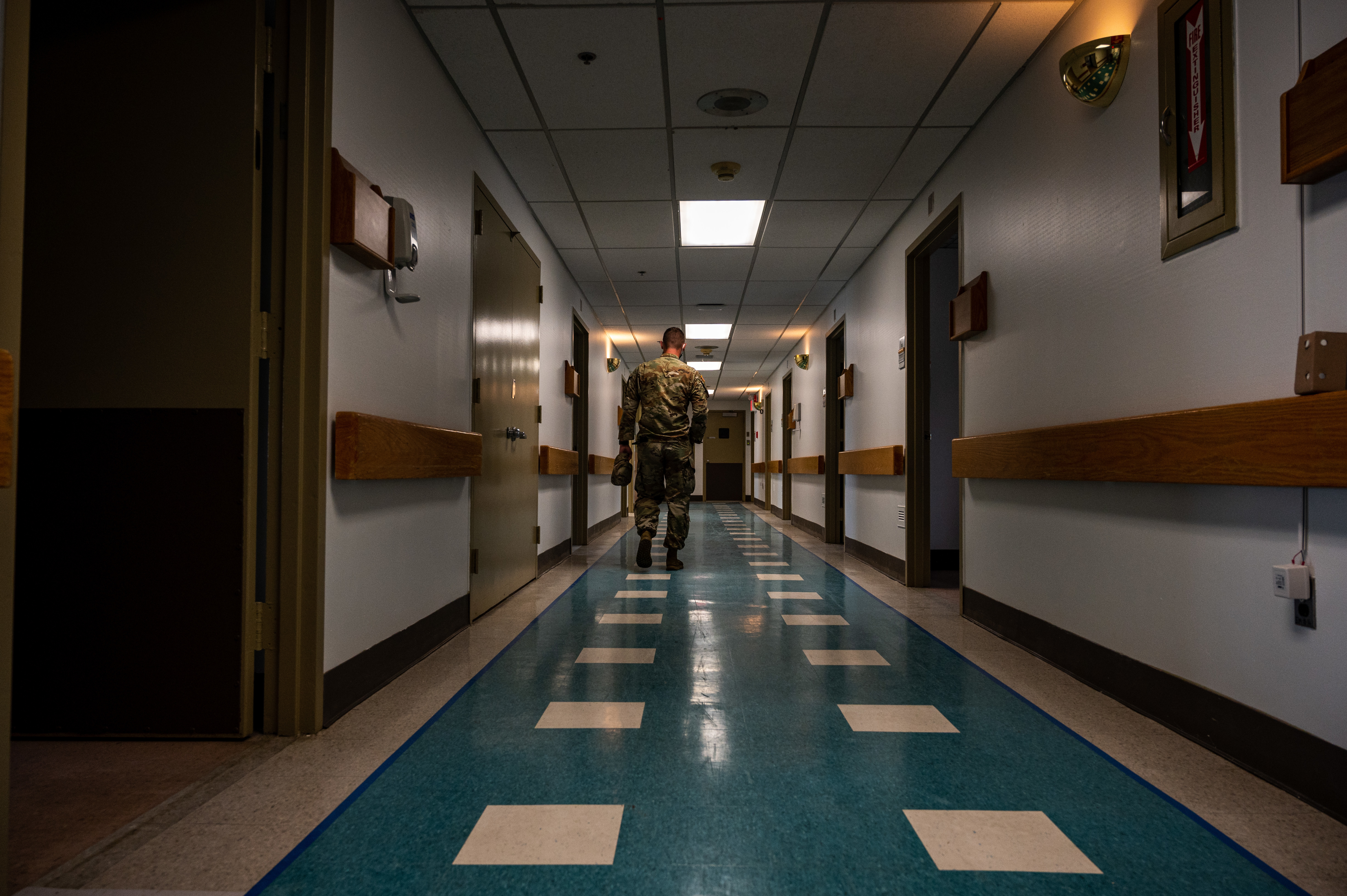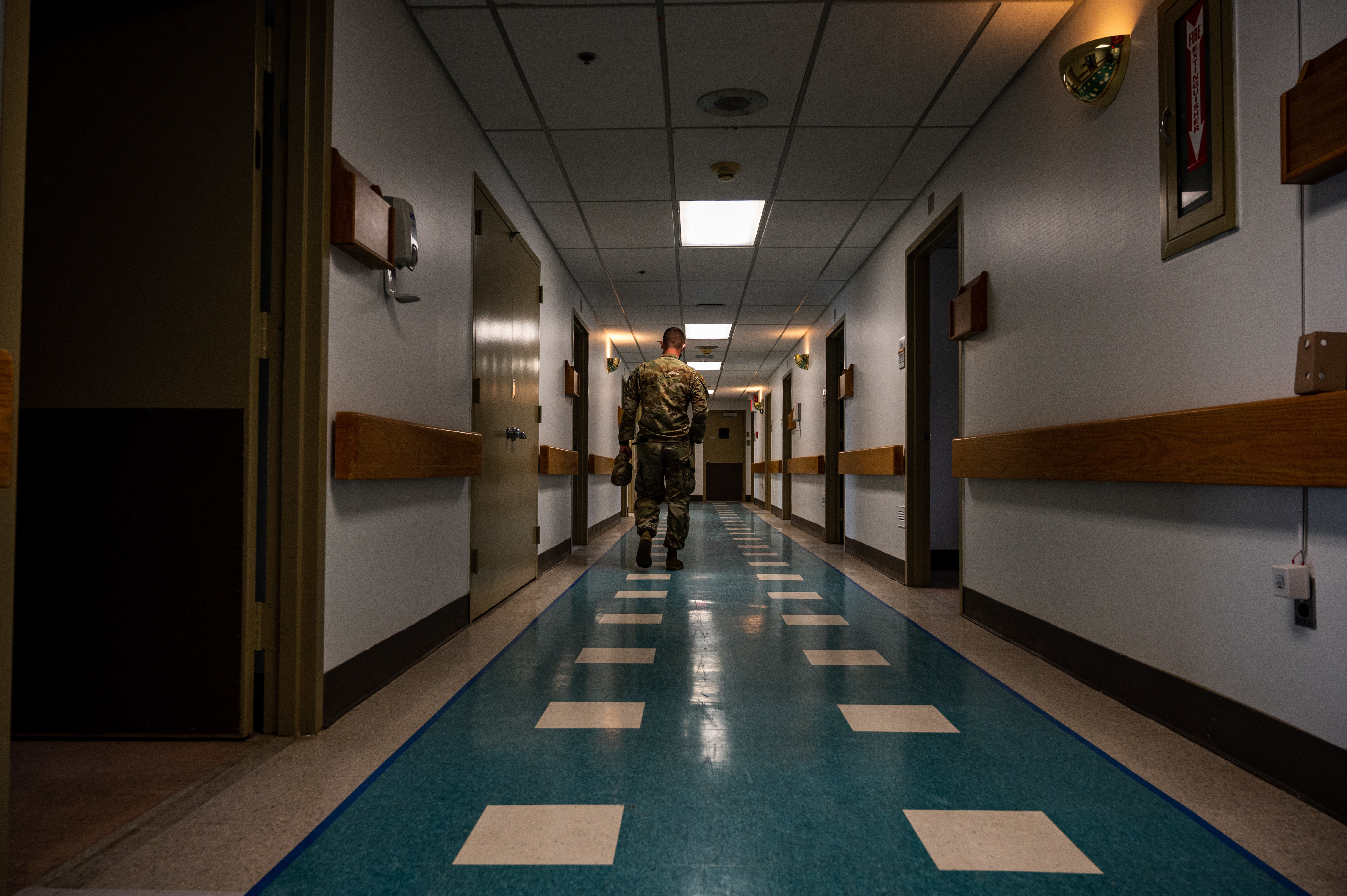

A Maryland Air National Guard member left paralyzed from “routine” back surgery at a military hospital had no legal recourse because of a 1950 Supreme Court decision called the Feres Doctrine which rendered the government free of legal accountability for service member injury claims.
Now, veteran groups are trying to bring the case before the Supreme Court in the hopes of overturning the doctrine which, they argue, has denied thousands of service members legal recourse.
“It is high time for the courts that created Feres to end it once and for all,” according to the amicus brief filed by Just Well Law PLLC and the Coalition of Heroes. An amicus brief is a filing by outside parties supporting a previously filed court petition and signifies a step forward in their campaign to have the case heard by the highest court, a lawyer for the group said. Several veterans groups signed onto the brief, along with current members of Congress and former military officials.
Ryan G. Carter, a reservist in the Maryland Air National Guard, was paralyzed after receiving back surgery in April 2018. Carter was a staff sergeant dual-status technician who was in an inactive duty status when he was injured during surgery at Walter Reed National Military Medical Center in Bethesda, Maryland.
His surgery stemmed from a medical history of “degenerative cervical disk disease, chronic neck pain, difficulty with fine motor skills, as well as numbness and tingling in his fingers,” according to the original case filed in Maryland. The government submitted materials to reflect that his medical conditions were “in part” sustained from a pull-up fall during basic training. Carter did not dispute the government’s claim. In March 2018, medical professionals recommended Carter undergo surgery to alleviate and prevent the pain from worsening.
“The procedure was complicated by a loss and/or depression” in Carter’s measurable brain activity or “neurophysiological signals” during the “negligent placement” of a trial spacer (used to create space and relieve nerve compression) at his mid-cervical spine, according to court documents.
When he awoke from the anesthesia, he was unable to move his extremities. A second corrective surgery took place which was “unsuccessful.” He was transferred to a Veteran Affairs hospital for spinal cord rehab therapy. In 2019, he was recommended for discharge with a 100% disability rating. In 2020, he was relieved from active duty.
The brief was filed on behalf of the Coalition of Heroes, National Military Family Association, Reserve Organization of America, Jewish War Veterans of the USA, Swords to Plowshares, and The Center for Law and Military Policy.
According to an emailed statement from Just Well Law, it also has the support of Democrats and Republicans in Congress and retired military leaders: Rep. Darrel Issa (R-Calif.), Rep. Richard Hudson (R-N.C.), Rep. Kelly Armstrong (R-N.D.), Rep. Josh Harder (D-Calif.), Rep. Jack Bergman (R-Mich.), Rep. Sanford D. Bishop Jr. (D-Ga.), retired Brig. Gen. Sylvia R. Crockett, retired Gen. Charlotte Miller, and retired Maj. Gen. William Suter.
Subscribe to Task & Purpose today. Get the latest military news and culture in your inbox daily.
The Feres Doctrine has long faced criticism from service members, military families and advocacy groups who argue that the Supreme Court precedent sets a double standard: One set of rules for civilians and another for service members. Under Feres, if a civilian and a service member went to the same hospital and received care for the same injury and malpractice occurred in both cases: the civilian could file a claim for damages against the government, but the service member could not.
“That’s the absurdity of the Feres Doctrine. Family members who were in the same household have different relief,” Kristina Baehr, a lawyer who helped file the brief, told Task & Purpose.
Is it the right time to revisit Feres?
The Feres Doctrine blocks members of the military from bringing legal claims against the government for injuries, or in the case of death, it blocks their families from filing a claim. The precedent stems from a controversial court ruling over a case involving the Federal Tort Claims Act, a law that governs how U.S. citizens can sue the government for negligence or wrongdoing.
In 1950, the Supreme Court dismissed a lawsuit brought by the widow of Army Lt. Rudolph Feres, who died in 1947 when his barracks caught fire due to a defective heating system. The Supreme Court ruled that the federal government could not be held liable “for injuries to members of the armed forces arising from activities incident to military service.”
Baher said that the case is ripe for this Supreme Court because they are “fairly conservative and textualist” which would mean that a plain interpretation of the FTCA would show that there is no Feres exception for the military, she argued. The Feres exception, she noted, was created by judges.
“If the courts were willing to overturn Roe V Wade, even though there’s a long history of Roe V Wade then perhaps it’s time for the court to consider overturning the Ferris doctrine,” Baehr said, “because this court seems willing to overturn prior opinions, prior doctrines by looking at the actual text and what it actually says and the text of the Federal Tort Claims Act has no exception for service members.”
The brief was filed with the Supreme Court because Carter’s lawyer petitioned the court after the case was denied by the Fourth Circuit Court of Appeals.
“This case is different because the Supreme Court asked for a response from the government on this petition. Typically, if it wasn’t interested in hearing it, it wouldn’t ask the government to issue a response,” Baher said.
Feres precedent, previous cases
The brief also includes the story of Lauren Palladini to highlight the “absurd consequences” of the Feres doctrine. Palladini, who is president of the Coalition of Heroes which filed the brief, nearly lost her life and was severely injured from a botched surgery at Womack Army Medical Center at Fort Liberty, North Carolina.
At 22 years old, she underwent a cesarean section while on active duty in the Army when a hemorrhaging artery led to 39 days of extraordinary blood transfusions and other serious procedures. While she survived, the hysterectomy as a result of the malpractice “erased her dreams of conceiving and carrying future children.”
Now, veterans groups representing Carter are arguing that the Feres decision contradicts the text and purpose of the Federal Tort Claims Act and wrongly denies military members of “orthodox legal remedies that Congress clearly opted to supply.”
The group argues that the Feres Doctrine is “now fully unhinged and incoherent,” and has grown to deny blanket relief for all servicemember injuries “even remotely related” to their military status without regard for the event location or “nexus between the injury-producing event” and the essential defense or military purpose from which the injury took place.
While the group admitted that the issue could’ve been taken up by Congress but also said “decades of inaction have passed the buck back.”
The brief acknowledges that the doctrine has been challenged many times before them but said that each new effort highlights “Feres as indefensible.”
Medical malpractice claims
In 2021, the Pentagon published interim rules for how military personnel and their families can submit medical malpractice claims for damages to the government. In May, the Defense Department published the final rule. The rules established a claims process which means servicemembers are still barred from pursuing court cases — meaning little room to legally challenge the military’s final decision once the process is complete.
In the original case, the government suggested that Carter pursue redress through the new process.
It’s unclear if Carter pursued claims through the Pentagon’s mechanism after it was established.
“Turning a blind eye to Feres aggravates an institutional crisis, as the Armed Forces struggle more than ever to fill the ranks due to widespread institutional “mistrust,” the brief said. “That mistrust surely grows whenever headline-grabbing military tragedies occur and Feres absurdly denies recovery.”
